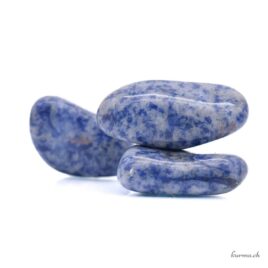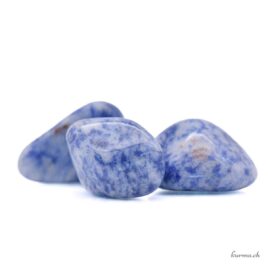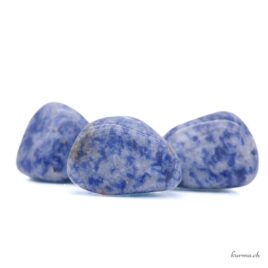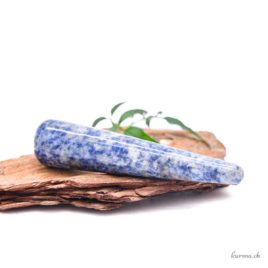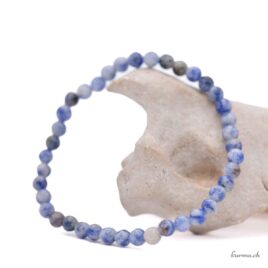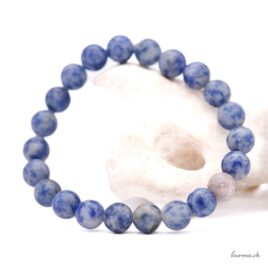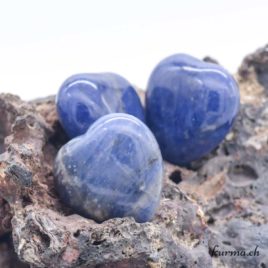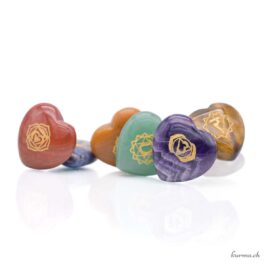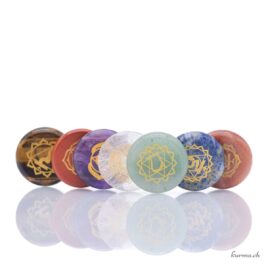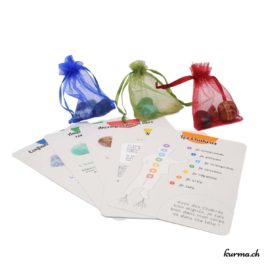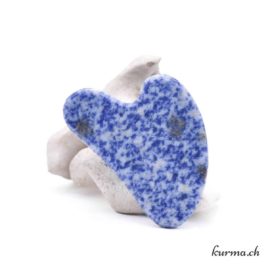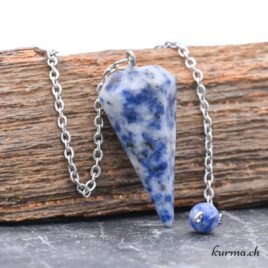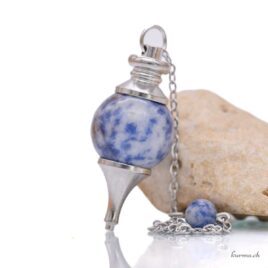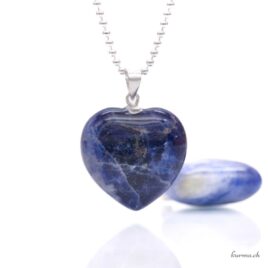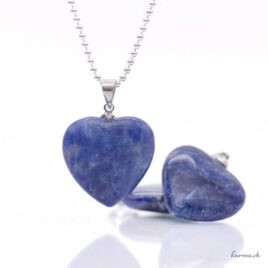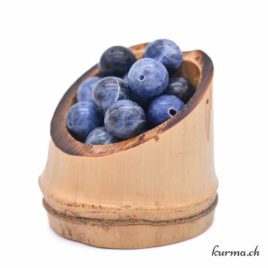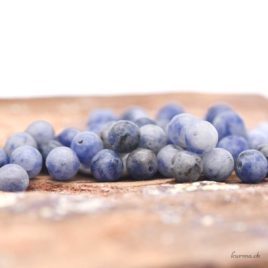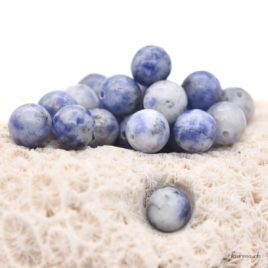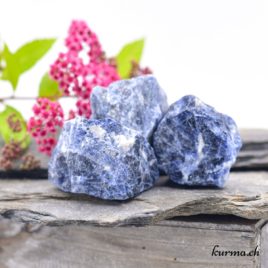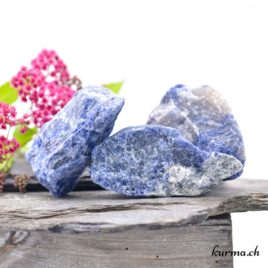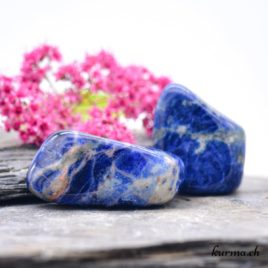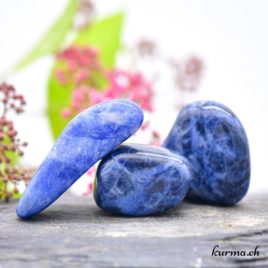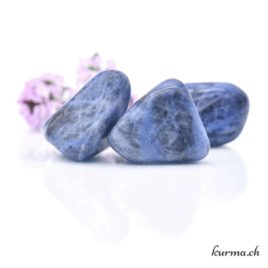Sodalite
Azul Bahia, gemstones, rough and rolled, massage sticks, bracelets, cabochons, hearts, Gua Sha palms, pendants, beads, menhirs, orgonites
Sodalite, the stone of thinkers, is also a stone of protection against negative influences in lithotherapy.
With its various shades of blue, Sodalite invites the spirit to open up and spread the wings of freedom.
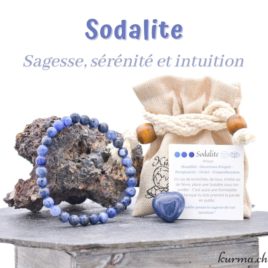
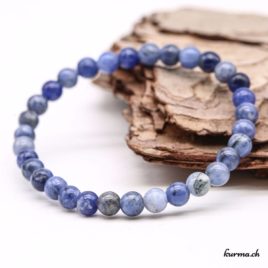
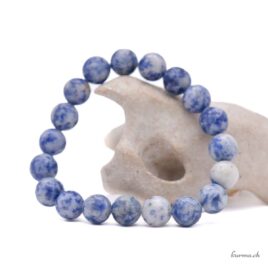
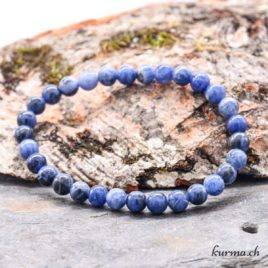
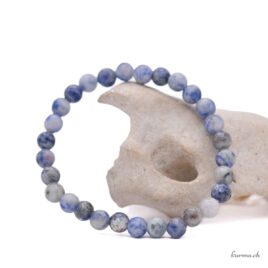
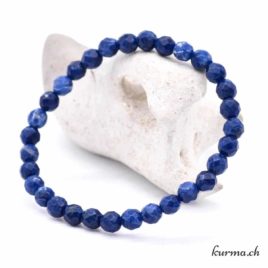
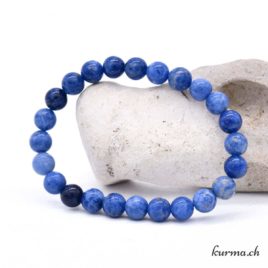
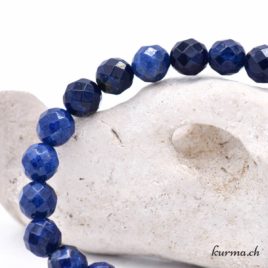
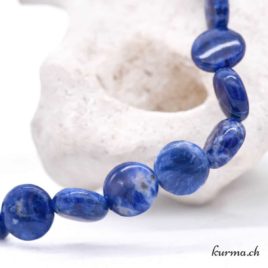
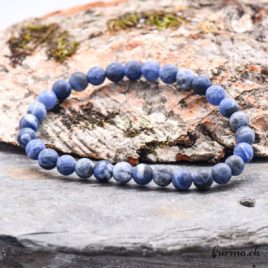
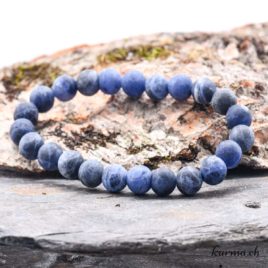
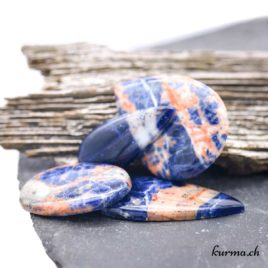
What are the lithotherapy virtues of Sodalite?
The origin of its symbols
It was its high sodium content that earned the name Sodalite for this stone, discovered in 1806 and studied in 1811 by chemist and mineralogist Thomas Thomson. Previously, the gaps in mineralogy made it impossible to differentiate Sodalite from Lapis lazuli or Dumortierite. So, tracing its history is no simple matter.
Archaeological excavations have revealed that this stone was frequently used for offerings and jewelry 4,000 years ago in northern Peru. Mochica jewelry of exceptional quality and beauty, created using a mosaic technique containing fragments of Sodalite and dating back 2,000 years, has also been discovered in southern Peru.
However, solid archaeological evidence is lacking to establish its symbolic value in antiquity, in America, Europe and elsewhere.
In the early 20ᵉ century, it became a fashionable stone when it was offered to dignitaries on a diplomatic visit to Canada. When Princess Mary of Wales discovered Sodalite at an exhibition, she loved the stone so much that 130 tons of Sodalite from Canada were delivered to England. Many luxury jewels and watch dials are now made from Sodalite.
Its properties and spiritual benefits in lithotherapy
Lithotherapy associates Sodalite with the comfort needed in a quest for truth, protection and support for mental clarity and logic.
Sodalite is considered a stimulant of the intellect and rationality. In so doing, it calms the mind, promoting emotional stability for better concentration and communication.
It will be useful for and who have difficulty coping with anxiety and stress. It will calm disabling intrusive thoughts and boost self-confidence.
A reminder of the benefits of peace of mind contributes to your own understanding, by identifying your misunderstandings with others. It reveals in a new light the soothing power of self-expression, freeing you from rigidity to better listen to your intuitive perception.
With Sodalite, you can learn to open your wings and gain height. To look at the world from different points of view, so that a more global vision suggests the direction to take. In lithotherapy, Sodalite activates the awareness that encourages you to seek the truth, beyond the traps of limiting beliefs and repetitive patterns.
And freed from any ascendancy by the stone's protection against harmful outside influences. Its power is serene. It teaches humility, tolerance and vigilance, which can help you stay true to your inner life, intuition and essence as you embark on a new path.
Much appreciated by hypersensitive people, Sodalite possesses soothing virtues and helps one to cope better with one's emotions. It also helps to develop rational and logical thinking and to communicate with kindness to self and others.
Azul Bahia Sodalite
Sodalite Azul Bahia is a Brazilian variety with an intense blue color and random white or gray veins.
Used in jewelry and decoration, its purity and beauty are praised by aesthetes and collectors alike.
In lithotherapy, it is renowned for its properties supporting and amplifying mental clarity and serenity.
The physical benefits of Sodalite
No scientific proof, but a well-established tradition: in lithotherapy, on a physical level, Sodalite can help reduce fever and cure ear infections and bronchitis. It can also help relieve disorders related to the throat, larynx and vocal cords, in cases of hoarseness or aphonia.
How to use Sodalite
- On a vision quest? Place a Sodalite on your forehead during meditation
- in case of bronchitis or chronic ear infections, a Sodalite under your pillow
- for clearer and more structured communication, combine Sodalite with Fluorite
- that a Sodalite accompanies you during particularly stressful and emotionally exhausting events.
- To benefit from Sodalite's therapeutic effects, we recommend regular contact with it, preferably directly on the skin.
Where to place a Sodalite?
- A Sodalite in your home diffuses energies conducive to awareness and harmonious communication between inhabitants.
- Its soothing virtues make it an ideal stone to place in your living room or bedroom. Close to your head while you sleep, it may encourage premonitory dreams.
- on your desk, Sodalite can help you see more clearly and work with a logical and rational mind.
- she's just as welcome in a space dedicated to healing or meditation.
Sodalite, for whom?
- For and who find it difficult to speak sincerely and who find it easy to use sarcasm, mockery and irony.
- for people who feel entangled in difficult situations or repetitive stories
- for the hypersensitive, the highly emotional, and those who have trouble sorting out their thoughts
- for people are often required to work as part of a team.
What minerals should Sodalite be associated with?
To amplify its benefits in lithotherapy, Sodality can be combined with complementary minerals:
- A combination with Fluorite or Fluorine can help you to express yourself more clearly.
- the accompaniment of Moonstone or Hecatolite can support you in balancing your emotions and listening to your intuition
- the energetic protection of Labradorite or Labrador stone will also stabilize your emotions.
Refilling and cleaning
How to purify Sodalite?
Under the Full Moon / running water for a few minutes, then dry with a soft cloth / shape waves (life flowers or sacred geometries) / fumigation (incense, white sage or palo santo, between 30 and 60 seconds) / singing bowl, Tibetan bells or tuning fork, natural breath/wind / intentionCare to avoid
Avoid salt and prolonged exposure to the sun, which can tarnish it.
Chakras
Throat chakra (Vishuddha)balance, clear and sincere expression
Third eye (Ajna) chakra
intuition, subtle perception
Astrological signs
Virginanalysis, mental clarity
Poisons
channel intuition, avoid emotional dispersion
Sagittarius
truth seeking, communication
Elements
Airmental clarity, thinking, logic, communication
Sodalite mineralogy
Sodalite is of magmatic liquid or volcanic formation. It very rarely forms crystals and is most often found as granular masses in large veins in sodium-rich igneous rocks, such as syenites and nepheline.
Sodalite is a sodium aluminosilicate, belonging to the Sodalite and Nosean groups and the tectosilicate class. It contains sodium, aluminum, silicon, oxygen and chlorine. Other elements (usually beryllium, calcium, potassium, magnesium, molybdenum and sulfur) are often included in its composition.
Sodalite is blue, gray, blue-gray, between azure and midnight or dark blue. It is almost always crossed by white lines or areas. It can be similar in appearance to Lapis lazuli, Azurite or Dumortierite.
The main sodalite deposits are found in Canada, Brazil, Namibia, Russia, India and Afghanistan.
It has a hardness of 5.5 to 6 on the Mohs scale.
Lithotherapy
- Element(s) :
- Zodiac(s) :
- Pisces, Sagittarius, Virgo
- Purification :
- Singing bowl, Water, Fumigation, Moon, Form waves, Breath
- Physics :
- Bronchi, Vocal cords, Throat, Ears
- Emotional :
- Clarity, Hypersensitivity, Stress, Emotionality, Balance
- Spiritual :
- Harmony, Intuition, Meditation
- Miscellaneous :
- Relationship (friendship), Relationship (love), Relationship (family)
Mineralogy
- Hardness :
- 5.5-6.0
- Moths scale:
- 5, 6
- Strunz classification :
- Silicate
- Crystalline system :
- Cubic
- Chemical element :
- Na, Al, Si, O, Cl
- Line color :
- White
- Density :
- 2.27-2.33
- Cleavage :
- Perfect
- Fracture:
- Unequal
- Transparency :
- Transparent to translucent
- Fluorescence :
- Yes, orange
- Colors :
- Colorless, white, yellow, yellowish, greenish, blue, reddish, gray, green, pink, violet, grayish white
- Magnetism :
- no
- Radioactivity :
- no
Throat chakra
*Please note! Some minerals may be toxic and must not be licked or ingested (as such or in the form of powder, elixir or stone water) or be in prolonged contact with the skin or mucous membranes.
*The information on the stones described here are general indications based on our research and experience, and are not exhaustive.
Reproduction in whole or in part of this content is prohibited. More info


